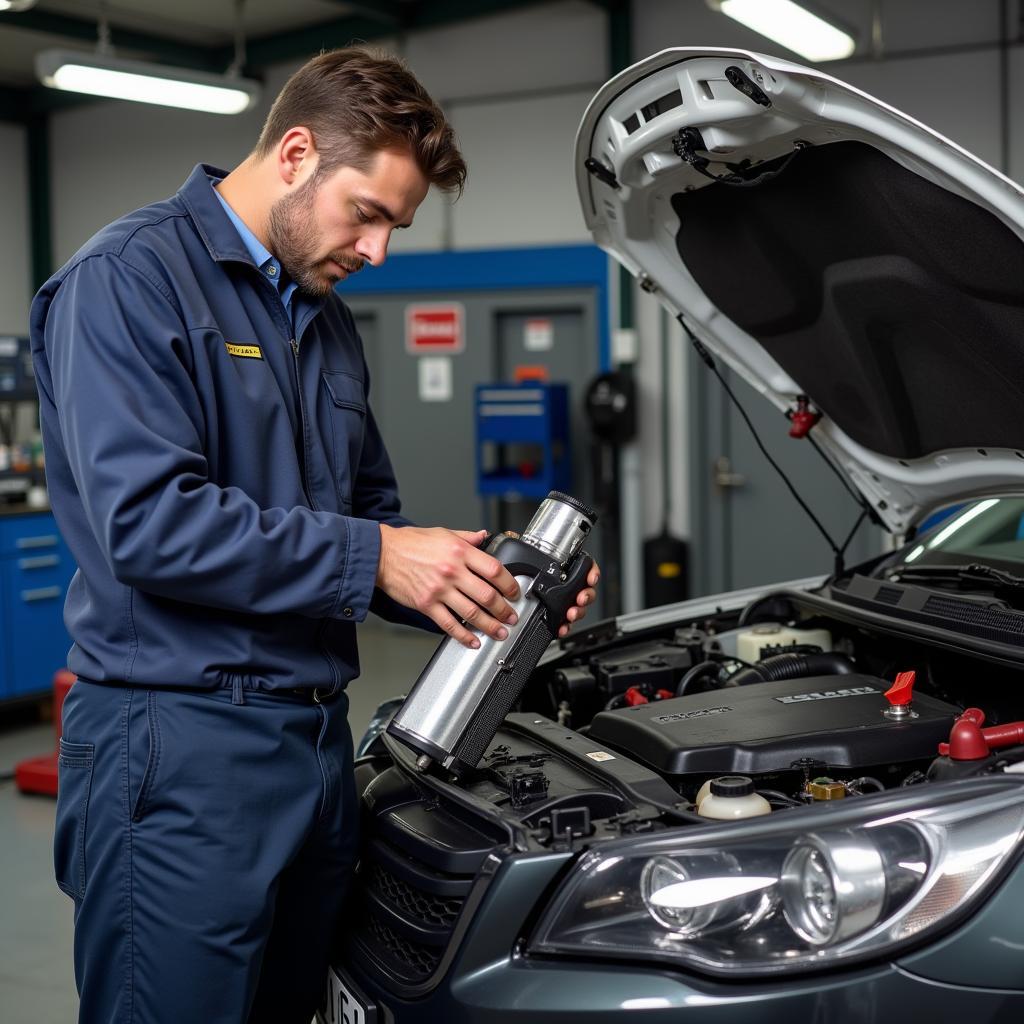A leaking car radiator can quickly lead to overheating and engine damage. Knowing How To Fix A Leaking Car Radiator is crucial for maintaining your vehicle and avoiding costly repairs. This guide provides step-by-step instructions, tips, and expert advice on how to tackle this common car problem. Let’s dive in and learn how to fix a leaking car radiator effectively. how to fix a leaking radiator in your car
Identifying the Leak Source
Before you begin any repairs, you must first locate the source of the leak. Carefully inspect the radiator, hoses, and clamps for any signs of damage, cracks, or corrosion. A flashlight can be invaluable in this process, especially in hard-to-reach areas.
- Radiator: Check the front and back of the radiator for cracks, holes, or leaks around the seams.
- Hoses: Squeeze the radiator hoses while the engine is cool. Feel for soft spots, bulges, or cracks. Look for leaks at the connection points where the hoses attach to the radiator and engine.
- Clamps: Inspect the hose clamps for tightness and signs of corrosion. Loose or rusty clamps can cause leaks.
How to Fix a Leaking Radiator Hose
A leaking radiator hose is a common culprit. Replacing a hose is relatively simple and inexpensive.
- Allow the engine to cool completely: Never work on a hot radiator.
- Drain the coolant: Place a drain pan under the radiator petcock and open it to drain the coolant.
- Remove the old hose: Loosen the hose clamps and carefully remove the old hose.
- Install the new hose: Attach the new hose to the radiator and engine, ensuring a snug fit. Tighten the hose clamps securely.
- Refill the coolant: Refill the radiator with the correct coolant mixture according to your vehicle’s specifications.
- Check for leaks: Start the engine and check for any leaks around the new hose and connections.
How to Fix a Leaking Radiator
If the radiator itself is leaking, you may be able to repair it with a radiator sealant. This is a temporary fix.
- Purchase a radiator sealant: Choose a quality radiator sealant compatible with your coolant type.
- Add the sealant to the radiator: Follow the instructions on the sealant bottle carefully.
- Run the engine: Allow the engine to run for the recommended time to allow the sealant to circulate and seal the leak.
- Check for leaks: Monitor the radiator for any further leaks.
“Radiator sealants are a good temporary solution, but they’re not a permanent fix,” says automotive expert John Miller. “For a long-term solution, it’s best to replace the radiator.” fix leaking plastic car radiator
When to Seek Professional Help
Some radiator leaks require professional repair. If you are unsure about any aspect of the repair process, it’s best to consult a qualified mechanic.
- Severe leaks: Large leaks or multiple leaks may indicate significant damage requiring professional repair.
- Leaks in the radiator core: Leaks in the radiator core are difficult to repair and often require radiator replacement.
- Complex cooling system issues: If you suspect a problem with other components of the cooling system, such as the water pump or thermostat, it’s best to have a mechanic diagnose and repair the issue.
 Professional Radiator Repair
Professional Radiator Repair
Conclusion
Knowing how to fix a leaking car radiator can save you time and money. By following these steps and taking preventative measures, you can keep your cooling system in top shape and avoid costly repairs. If you encounter a complex leak or are unsure about any part of the repair process, don’t hesitate to contact a qualified mechanic for assistance. Remember, a well-maintained cooling system is essential for your car’s performance and longevity. For personalized assistance with your car issues, connect with us at AutoTipPro. Call us at +1 (641) 206-8880 or visit our office at 500 N St Mary’s St, San Antonio, TX 78205, United States. car hose fix
“Regular maintenance, like checking your coolant levels and inspecting your hoses, can help prevent leaks before they start,” advises Maria Sanchez, a seasoned mechanic. cars to fix up for daiy driver
FAQ
-
What causes a car radiator to leak? Common causes include age, corrosion, physical damage, and faulty hoses or clamps. engine fixes my summer car
-
Can I drive with a leaking radiator? No, driving with a leaking radiator can lead to overheating and serious engine damage.
-
How much does it cost to fix a leaking radiator? The cost varies depending on the severity of the leak and whether the radiator needs to be repaired or replaced.
-
How often should I check my coolant levels? It’s recommended to check your coolant levels at least once a month.
-
What type of coolant should I use in my car? Consult your vehicle’s owner’s manual for the correct coolant type and mixture.
-
How can I prevent my car radiator from leaking? Regular maintenance, including flushing the cooling system and inspecting hoses and clamps, can help prevent leaks.
-
What are the signs of a leaking radiator? Signs include low coolant levels, overheating, puddles of coolant under the car, and a sweet smell.






Leave a Reply